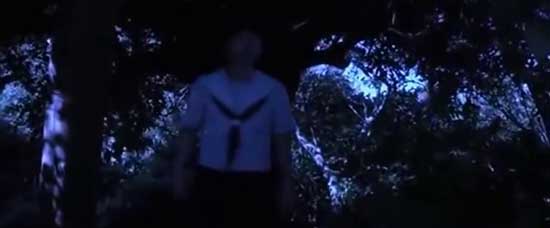SYNOPSIS:
A young girl learns of the urban legend of Teke Teke after her friend is killed in a gruesome way. The legend tells of a female ghost that has no legs. When she visits the spot where her friend died she comes into contact with it
REVIEW:
Teketeke is based on the eponymous Japanese urban legend. As is the case with many myths of it’s kind, no one really knows where the it originated from and different regions have their own little twists on the story, but the main protagonist is always the same: a female ghost that is missing the lower half of her body and moves by dragging herself on her hands and elbows. In most versions of the story she has lost her legs in an unfortunate encounter with a train, but the reasons for this range from accident to suicide. The places where she appears to people also vary wildly. She has been known to haunt school toilets (What? Why?), deserted highways and of course, and a bit more logically, locations near railways, such as overpasses. No matter where you encounter her though you better hurry, because if she catches you (and apparently, she most likely will, as she can even overtake speeding cars), your lower extremities will suffer the same fate as hers.
The director tackling this subject matter is none other than Koji Shiraishi, the man known for such films as Noroi: The Curse (2005), A Slith-Mothed Woman (2007) and Occult (2009). As I have mentioned before in my reviews, I am a big fan of his work, so I was quite excited to see what he had done with this quite interesting urban legend. It has a lot of great elements to build on and let’s face it, a very creepy ghost to work with, so I was hopeful that Mr. Shiraishi had once again created something genuinely unnerving.
Unfortunately, I was left quite disappointed this time. It’s not that Teketeke is a terrible film, it’s just incredibly mediocre one. There are so many different ways this subject matter could have been approached, but this is quite possibly the most middle of the road version one could imagine. The basic plot line is actually heavily borrowed from The Ring (main characters encounter a ghost and then only have a certain amount of days to solve the mystery behind her or death will surely follow), and that alone made the whole story feel tired and predictable. The somewhat clichéd characters don’t do the used-up story line any favours either. I also found that the speed of which the story moves in slightly problematic. It’s starts off with several people getting killed in quick succession and then all of the sudden slows down with almost nothing happening for quite a lengthy period of time. For example, there is a tediously long sequence with our main protagonists trying to find their way through country roads without a working satnav, which quite frankly made me want to check how much longer was left on the film. There is more ghostly action towards the end of the film, but not nearly enough to save it.
The ghost itself is also a bit of a let-down. The idea of a ghost cut in half dragging itself along just by its hands is certainly eerie one, but unfortunately the execution of this particular she demon left a lot to be desired. The special effects just don’t do the whole concept justice and even though the speed with which this ghost lady moves might be true to the original urban legends, there is just something a bit too comical about half a corpse speeding at 80 miles an hour for it to be considered scary. On the positive side I can say that at least the film didn’t have a happy ending but even the slightly dark turn in the very end wasn’t really enough to make me want to watch the sequel.
Like I mentioned above, this film was a disappointment to me. Had I checked beforehand who the screenwriter was (not Shiraishi), I would have not had quite as big expectations of it, and maybe I would have watched it with a slightly different attitude. Be that as it may, I don’t think my overall feelings about Teketeke would have changed that much. It’s ready chewed, mediocre and uninspired and not something I would really recommend to anyone.
 Horror News | HNN Official Site | Horror Movies,Trailers, Reviews
Horror News | HNN Official Site | Horror Movies,Trailers, Reviews













